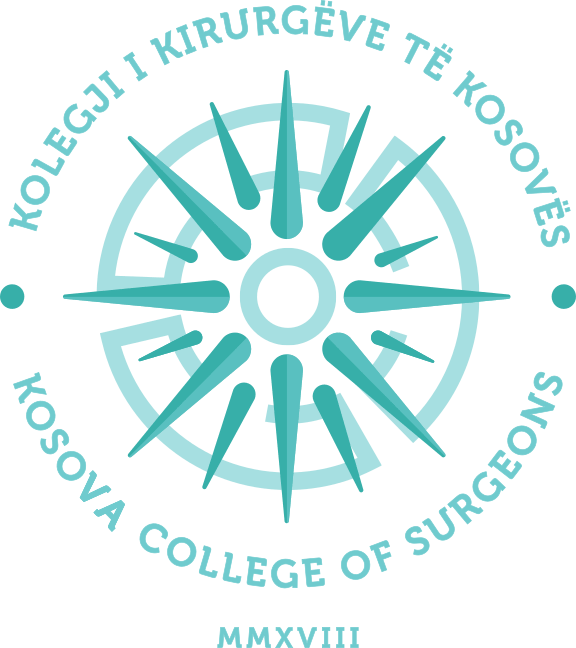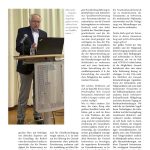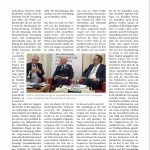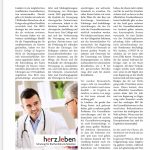December 20, 2023
During his stay in Austria in October of this year, the President of the College of Surgeons of Kosovo, Prof. Dr. Rifat Latifi gave an interview to the magazine of the Chamber of Physicians of Austria, which was published in the special issue at the end of the year, and which we are publishing here in its entirety.
“Austria Is A Great Friend”
- Question: You are the founder and president of the International Virtual e-Hospital Foundation. What exactly is the Foundation’s tasks?
Answer: The International Virtual e-Hospital (IVeH) Foundation is a non-profit organization (501c3), with its headquarters in Arlington, VA, USA (www.iveh.org). IVeH was created to assist in rebuilding the public healthcare system in post-conflict and developing countries. We strive towards this goal by introducing and implementing telemedicine, telehealth, and virtual education programs through the concept of the IVeH Network. The IVeH is managed solely by its volunteers and governed by an international Board of Directors. Since its establishment in 2001, the IVeH has worked diligently on establishing a fully functional and integrated regional telemedicine network and virtual education network in the Western Balkans, particularly in Kosova, Albania, and also worked with Northern Macedonia and Montenegro. We work towards accomplishing this goal through a strategy that we have named “Initiate- Build- Operate and Transfer (IBOT)” .
This effective strategy combines the establishment of robust telemedicine network and infrastructure, virtual educational programs through international collaboration and creation of human capacities that independently manage telemedicine and telehealth programs. Initiating, building, implementing and finally being able to see the result of 20 years of intensive work on telemedicine around the world, has been a great personal journey filled with joy, excitement, drama, an occasional disappointment, and many, many hours traversing the world from one corner to the other; away from my family, building bridges and friendships, laying down one brick for virtual care, building, a better healthcare system, a better future on each continent, except Antarctica. And it was worth it. Every bit of it! What started as a desperation attempt to rebuild Kosova’s destroyed healthcare system before and during the war of 1998/1999, the Telemedicine Program of Kosova has been transformed into an establishment and dissemination of telemedicine to Albania, Cabo Verde, Vietnam and other countries and has increased access to care tremendously. Transforming healthcare systems in developing and those post conflict countries has become a passion, my second professional life, apart from surgery. Furthermore, it has been most enriching experience, an experience that I would not trade for anything in the world. Some would say it has been a destiny. Now we have much to celebrate and thank many people from many countries have contributed to this in one way or another, but we still have a long way to go.
- To what extent can Austria contribute here?
Answer: Well, Austria has been a great friend of Kosova and has helped a lot. However, Austria can further contribute greatly. The dedicated donation or those through collaboration will make sure that our mission continues and IBOT becomes popular in all countries that we work. Moreover, it will help us transform the healthcare in a most cost-effective healthcare system in post conflict countries. Currently there are 34 countries with more than 2 billion people involved in wars or major conflicts. The IBOT strategy has been proven effective, again and again. We recently have created another sustainable model of transformation of healthcare in Kosova, by establishing the Kosova College of Surgeons (KCS), as an umbrella organization and as a scientific and advocacy body to lead the advancement of the discipline of surgery in Kosova that includes more than 1000 surgeons from 13 disciplines. The KCS, a non-profit scientific and educational association of surgeons, was founded in 2018 to improve the quality of care for the surgical patient by setting the highest standards for surgical education and practice. The College is dedicated to improving the care of the surgical patient and to advancing the ethical practice of surgery. The College is working together with the healthcare authorities of Kosova to standardize the care, practice and protocols of surgical care and will work to advance the clinical, scientific and research agendas of surgery in Kosova in order to achieve worldwide standards. Moreover, we have serious plans to build research, simulation, and training and educational facilities that truly will change the face of healthcare system. Would love to have the opportunity to work with Austrian community, governmental or NGOs of Austria in this major project. At the same token, we can help Austria implement telemedicine programs, particularly in chronic diseases such as those in geriatric population, but for more acute as well.
3.What challenges does a health system in post-conflict countries specifically face – compared to countries without recent disruptive development?
Answer: There are several major problems in countries that just came out of the war: The healthcare facilities and infrastructure are often destroyed, there is a major disruption of healthcare services; major backlog of elective surgery and so now patients go to the doctor very late. To top this state of despair, there is significant or massive brain drain of healthcare professionals, who perhaps left as refugees, or simply got hired from very countries that maybe helped during the war, who pay them more and are safer for them and their families, so there is no experts in public hospitals, so they have to leave entirely the country and go abroad for healthcare services , incurring catastrophic expenses. So countries, such as in the post-war Kosova, for years (or worse, decades) only dealt with emergency services. We thought COVID-19 was bad, when we did not have elective cases. Try that during the war or post war. All these changes, become even worse, when (usually) and new government comes in, and has to prioritize the meager budget that they have. In addition, unfortunately, the public healthcare system was kept unfunded year after year, government after government and has the lowest GDP for healthcare in the Western Balkans countries and amongst the lowest in the world. When you have the lowest GDP, and high corruption rate, the results are catastrophic.
- Question: Is this also an opportunity to be able to redesign structures from scratch?
Answer: In a way yes. But transformation needs to be planned long-term, while you simultaneously deal with emergencies. There is a need for expanding clinical services to increase access for patients and learners to care and education, developing a strategic plan with input from honest experts based on individual countries needs that will curtail the need for patients to go abroad. This means, to create their own expertise and ensuring diversifying faculty and equity, that is expand leadership of healthcare system without political prioritization, and education at all levels of healthcare. In addition, there is a need for optimizing the clinical efficiency and revenue, that ensuring good hospital governance, and support quality improvement and patient safety initiatives to improve health outcomes. This is translated into ensuring high quality of services and stopping the bleeding of patients out of the country. Furthermore, the rebuilding of healthcare system should be data based with infrastructure dedicated to quality cutting-edge research, in order to improve quality of services and visibility, and continuous healthcare staff and development, that is medical staff human capacity development. - What problems did the Republic of Kosovo face in rebuilding its health system and what solutions were and are being pursued?
Answer: Like in many other countries coming out of war or major conflicts, Kosova was faced with many issues, that span for years of occupation, and systematically destroying healthcare system. So, there is a need for major transform healthcare system, elimination of corruption imbedded in just about all layers of healthcare system, the organized crime in healthcare, in order to improve the quality of services care, increase accountability, build modern human capacities, modernize hospital infrastructure, improve transparency, and apply medical diplomacy, and stop treatment out of the country. - What role does telemedicine play in this and what are some of the challenges?
Answer: The biggest advantage of telemedicine and telehealth in every country and every condition, and particularly in crisis, such we had during the COVID-19, is the ability to continue providing health services at a physical distance. In the USA, the majority of healthcare institutions use some form of telemedicine or telehealth thanks to significant advances in telecommunications including and not limited to improved high-resolution imaging and greater access to broadband. Although nascent technologies, infrastructure, and legislation are increasingly discussed and improved, they remain today at an early stage of integration and diffusion in the current healthcare system. While, I believe that telemedicine and telehealth are finally at the center stage, there are challenges to continue with this momentum. The most important challenges to widespread diffusion of telemedicine are lack of standardized approach and guidelines describing the uniform criteria as to when telemedicine should be a part of the care; absence of clarity on the ways and mechanisms of reimbursement; licensure issues when telemedical care has to cross state or country lines; compliance with the Health Insurance Portability and Accountability Act (HIPAA) privacy and security rules; and liability and malpractice insurance issues. In addition, technological failures and human factors are also to be considered, but with recent advances, the integration of technology with human factors has become almost seamless. Moreover, with a perfect integration of telemedicine and telehealth in the care of chronic diseases, care continuity questions may arise. The aforementioned factors are probably the reason why telemedicine needs to be integrated into the current healthcare system. From the very beginning of telemedicine technology has not been a problem. Human factor has been. Now that we have internet everywhere, the communication is not an issue. The decision to do telemedicine from institution is. - What can a country like Austria learn from the experiences in Kosova for the ongoing transformation of its health system – or are the conditions too different?
Answer: When comes to telemedicine, most of the countries in the world, with some exception, are on the same boat. Austria would be a perfect place to have widespread telemedicine system. Integrating telemedicine and telehealth into the healthcare system permits the following: patient safety and elimination of all the inconveniences the patient experiences, including interrupting their day, travel by car or other modality to the doctor’s office, spending time parking (oftentimes they have to pay for parking), waiting in the waiting room with other sick patients, and eventually be seen by the provider. This process is long, arduous, and in many cases not necessary. Most clinical encounters can be done virtually using telemedicine and telehealth.
8.You have in-depth experience with the US healthcare system. To what extent has this knowledge helped you in your role as Kosovo’s Minister of Health? What did you want to make similar and what did you consciously want to make different?
Answer: Having trained at Yale University and worked in some of the best healthcare centers in US, helped a lot. I like to work with data. After doing a SWOT analysis of the entire clinical healthcare system, I diagnosed the state of healthcare of Kosova as catastrophic. The post war healthcare system was developed based on what donors wanted, and not based on genuine analysis and long-term plans. Way too many (very expensive) feasibility studies, often done by the same country or same agency or even the same person from the same country came up with same conclusions, but nothing was done and leadership of healthcare system did not even read those studies. Everyone who came to work in Kosova wanted to do their own feasibility study. It was disguising. So much money was spend on those studies.
In Kosova we needed to invest in quality of services, which includes infrastructure and human capacities. This will increase the volume, and cut down the brain drain, as well as patients going elsewhere for care, and subsequently will be profitable. Those profits then need to be invested in quality of care. To close this entire cycle, we need to create 12 centers of excellence and 22 advanced fellowships with new experts, that will take the healthcare system in a whole new direction. These take time. Transformation of healthcare system should not be used for election opportunity.
In Kosova Minister of Health I wanted to get the expertise and quality of care of like the one I provide here in the States, but wanted to keep it cheaper and not out of control healthcare spending.




